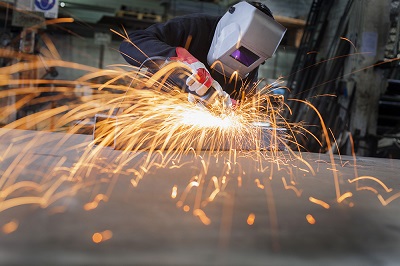There are also different types of engineering for you to pursue, from mechanical to electrical to biomedical. With so many options, it can be difficult to decide which one to study in college.
One area of engineering that you may not know about but should consider is welding engineering. Not only does this position offer exciting challenges and different responsibilities, but it also pays very well – the national median salary for a welding engineer is $85,000.
Welding engineering combines a wide range of disciplines – including chemistry, physics, mathematics, engineering and project management – with the focus on joining metals for strong, safe structures and products.
 Figure 1: Welding engineers are on the cutting edge of welding automation.
Figure 1: Welding engineers are on the cutting edge of welding automation.
As a welding engineer, you can work in a variety of roles such as:
● Researching and implementing improved welding processes
● Developing new equipment that improves efficiency, productivity and safety
● Overseeing welding operations in manufacturing settings, including quality control and making sure all standards and codes are being followed
● Helping with inspections and correcting any problems that are found
 Figure 2: Having experience as a welder is extremely beneficial as a welding engineer.Whether you have hands-on welding experience or not, you can earn a degree in welding engineering or materials engineering from an accredited college or university. Depending on your career goals, you can pursue either a bachelor’s or master’s degree.
Figure 2: Having experience as a welder is extremely beneficial as a welding engineer.Whether you have hands-on welding experience or not, you can earn a degree in welding engineering or materials engineering from an accredited college or university. Depending on your career goals, you can pursue either a bachelor’s or master’s degree.
While every school is different, you can expect your program to cover:
● Fundamentals of engineering
● Advanced welding techniques
● Science – Chemistry and physics
● Mathematics – Calculus and trigonometry
● Design
● Advanced welding processes
● Project management
Additionally, your college program may also require or recommend that you complete an internship. This can be a great way to get on-the-job training from seasoned engineers, gain valuable real-world experience, and possibly lead to a job after graduation.
After graduating from college and gaining some experience, you can become certified through the American Welding Society (AWS) Certified Welding Engineer (CWEng) program. Since this is the only recognized professional certification for welding engineers issued within the U.S., being a CWEng can help you attract top employers and land the most competitive jobs.
Once you become a Certified Welding Engineer, you can look forward to a stable and rewarding career. Welding is a critical process in many industries, and welding engineers are some of the most in-demand and highest-paying jobs in the field.
The world will always need engineers. When choosing an engineering major to study in college, you should consider your personal interests and career opportunities. Now that you know more about welding engineering, you can look for schools that offer a program to help you enter this exciting career path.
聯(lián)系人:Rob
微信:18666076565
手 機:18925189619 (In Mandarin, Cantonese & English)
電 話:020-31190575
郵 箱:sales@gzyuto.com
公 司:廣州粵拓機電設(shè)備有限公司
地 址:廣州市番禺區(qū)橋南街蜆涌村市南路653號102
網(wǎng)站: m.graaaaaagh.com